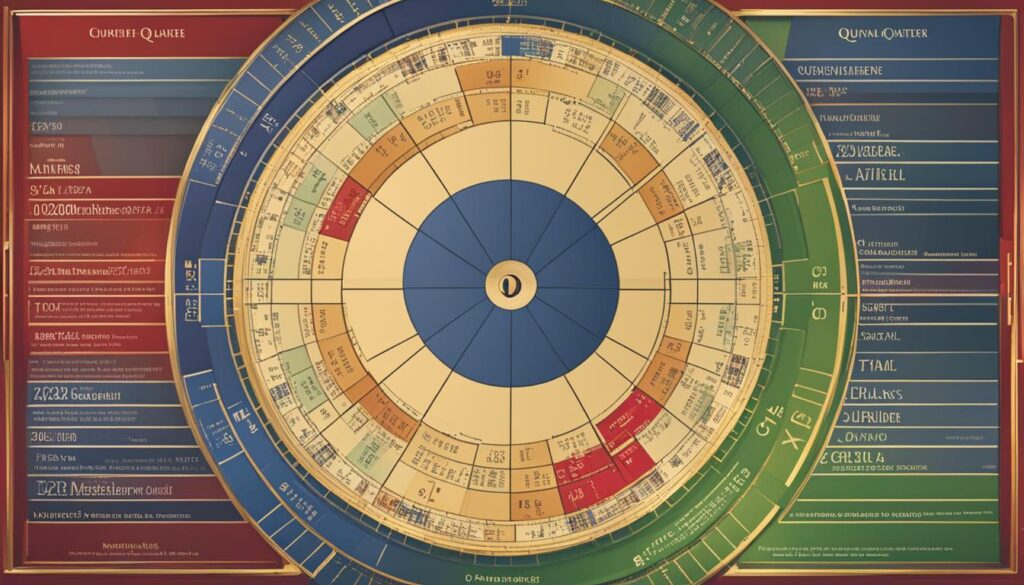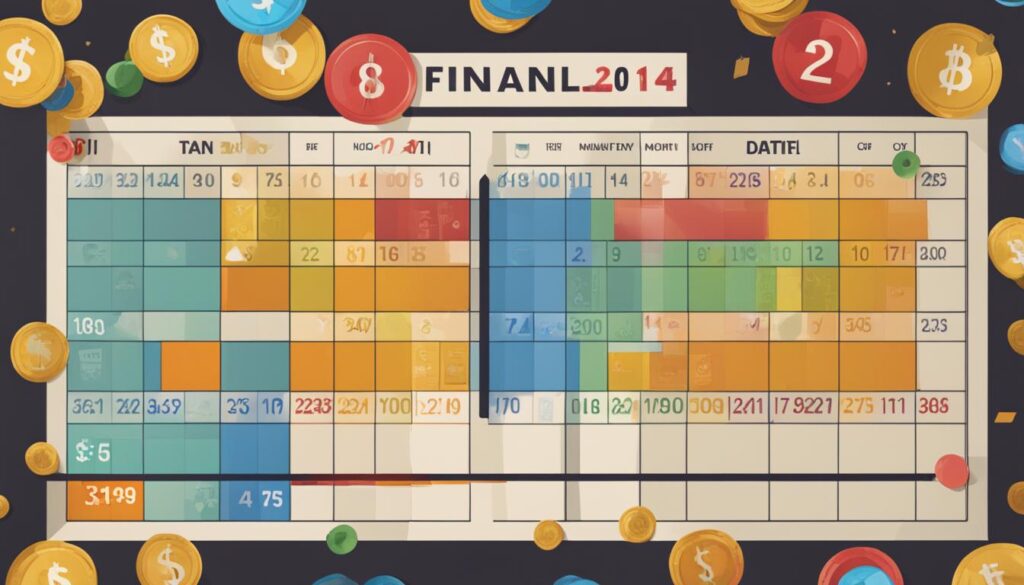In today’s fast-paced world, managing our finances effectively is essential for a successful financial future. With numerous financial obligations and important dates to remember, it can be overwhelming to stay on top of everything. That’s where a financial calendar comes in. A financial calendar is a powerful tool that helps you organize and track key dates related to your finances, ensuring that you never miss an important deadline or event.
From tax deadlines and payment due dates to market-moving events, having a financial calendar allows you to optimize your financial success and avoid costly mistakes. By having all the important dates in one place, you can plan ahead, allocate funds accordingly, and make informed financial decisions.
Whether you prefer a digital calendar or a traditional paper calendar, the key is to regularly review and update it to ensure it remains accurate and relevant to your financial goals. Start organizing your financial calendar today and take control of your financial future.
Key Takeaways:
- Organizing your finances with a financial calendar can help optimize your financial success.
- A financial calendar helps you avoid costly mistakes by keeping track of key dates.
- Include important dates such as tax deadlines and market-moving events in your financial calendar.
- Regularly review and update your financial calendar to ensure it remains accurate.
- Start organizing your financial calendar today to take control of your financial future.
Why Have a Personal Finance Calendar
A personal finance calendar serves as a powerful budgeting tool that helps you manage and plan for important financial obligations throughout the year. It allows you to allocate funds for taxes, savings, major expenditures, and holidays, ensuring you don’t miss any crucial financial deadlines. Additionally, a finance calendar acts as a preventive measure, helping you avoid late payment fees and unnecessary expenses. By keeping track of financial events, you can stay on top of your financial goals and make informed money decisions.
Having a personal finance calendar provides several benefits. First, it helps you stay organized by visualizing your financial commitments in one place. You can easily see upcoming due dates for bills, loan payments, and taxes, ensuring that you’re prepared and can budget accordingly.
Furthermore, a personal finance calendar acts as a reminder system, sending you notifications for upcoming due dates and events. This helps you stay proactive and prevents you from missing payments or important financial deadlines. By avoiding late fees and penalties, you can save money and maintain a strong financial standing.
The Benefits of a Personal Finance Calendar
- Provides an overview of your financial commitments
- Helps you allocate funds for important expenses
- Prevents late payment fees and penalties
- Keeps you on track with your financial goals
- Acts as a reminder system for important dates and events
By utilizing a personal finance calendar, you can gain better control over your finances and make smarter money decisions. Whether you prefer a digital calendar or a physical planner, find a system that works for you and make it a habit to review and update it regularly. By doing so, you’ll be able to stay organized, avoid financial stress, and achieve your financial goals.
| Financial Calendar Benefits | Financial Calendar Features |
|---|---|
| Organize and track key financial dates | Set reminders for due dates and events |
| Allocate funds for taxes, savings, and major expenses | Visualize financial commitments in one place |
| Prevent late payment fees and penalties | Stay on track with financial goals |
Essential Dates for Your 2023 Financial Calendar
To ensure a well-organized and optimized financial calendar for 2023, it’s important to include key financial dates that may impact your personal finances. By staying aware of these dates, you can effectively plan and make informed financial decisions throughout the year.
Tax Deadlines
One crucial set of dates to mark on your financial calendar are tax deadlines. These include the filing date for individual tax returns, which for 2023 is April 18. It’s essential to submit your tax return on time to avoid penalties and potential interest charges. Additionally, throughout the year, there are estimated tax payment due dates that you should be aware of, depending on your income and tax situation.
Market-Moving Events
Another important element to consider are market-moving events, which can significantly impact the stock market and your investments. Two key events to monitor are the release of the Employment Situation report and the Federal Open Market Committee (FOMC) meetings. The Employment Situation report provides insight into the state of the job market and can drive market volatility. The FOMC meetings, on the other hand, determine monetary policy, including interest rates, which can directly impact the stock market.
By including these tax deadlines and market-moving events in your financial calendar, you can stay informed and prepared to make strategic financial decisions.

| Tax Deadlines | Market-Moving Events |
|---|---|
| April 18 – Individual tax return filing deadline | Release of Employment Situation report |
| Estimated tax payment due dates throughout the year | Federal Open Market Committee (FOMC) meetings |
Managing Debt and Budgeting
When it comes to achieving financial stability, managing debt and budgeting effectively are key components. By understanding how to manage debt and create a realistic budget, you can take control of your financial future. Here are some debt management strategies and budgeting tips to help you on your journey towards financial health.
Debt Management
Debt management involves keeping track of your debts and finding strategies to pay them off efficiently. One important metric to consider is your debt-to-income ratio. This ratio is a comparison of your monthly debt payments to your monthly income. A high debt-to-income ratio can indicate financial strain and may make it difficult to qualify for loans or secure favorable interest rates. To improve your debt-to-income ratio, you can focus on paying off high-interest debts first or consider debt consolidation to streamline your payments.
Budgeting Tips
Creating a budget allows you to allocate your income towards different categories, such as necessities, savings, and discretionary spending. Here are some tips to help you budget effectively:
- Track your expenses: Keep a record of all your expenses, including small purchases. This will give you a clear picture of where your money is going.
- Set financial goals: Define your short-term and long-term financial goals. These goals can help you stay motivated and focused on your budgeting efforts.
- Create an emergency fund: Allocate a portion of your budget towards building an emergency fund. This can provide financial security and protect you from unexpected expenses.
- Review and adjust regularly: Regularly review your budget and make adjustments as needed. Life circumstances and financial priorities may change, so it’s important to adapt your budget accordingly.
| Debt Management Strategies | Budgeting Tips |
|---|---|
| Focus on high-interest debts first | Track your expenses |
| Consider debt consolidation | Set financial goals |
| Pay more than the minimum payment | Create an emergency fund |
| Communicate with creditors | Review and adjust regularly |
“A budget is telling your money where to go instead of wondering where it went.” – Dave Ramsey
By implementing these debt management strategies and budgeting tips, you can take control of your finances and work towards a debt-free future. Remember, managing debt and creating a budget is a journey that requires discipline and perseverance. Stay committed to your financial goals, and you’ll reap the rewards of financial freedom and stability.

Planning for College and Retirement
For individuals planning for college or retirement, it is essential to include key dates in your financial calendar to stay organized and prepared. Mark your calendar for the Free Application for Federal Student Aid (FAFSA) deadline on June 30, which is the last day to submit your application for the 2023-2024 school year. Filing the FAFSA early can increase your chances of receiving financial aid. Additionally, note the college tuition due dates to ensure timely payments and avoid any penalties or late fees.
Retirement planning is equally important, and including retirement savings contributions in your financial calendar can help you stay on track with your savings goals. Consider making contributions to retirement savings accounts by the end of each year to take advantage of tax benefits and maximize your retirement fund growth. By planning ahead and including these important dates, you can effectively prepare for college expenses and secure a comfortable retirement.
FAFSA Deadline and College Tuition Due Dates
| Date | Event |
|---|---|
| June 30 | FAFSA Deadline |
| Varies | College Tuition Due Dates |
FAFSA Deadline: June 30 is the last day to file the Free Application for Federal Student Aid (FAFSA) for the 2023-2024 school year. Submitting the FAFSA early can increase your chances of receiving financial aid.
College Tuition Due Dates: College tuition due dates vary depending on the institution. It is crucial to mark these dates in your financial calendar to ensure timely payments and avoid penalties or late fees.
By including these important dates in your financial calendar, you can effectively plan for college expenses and secure a comfortable retirement. Stay organized and prepared by staying on top of these key dates.
Holiday Shopping and Year-End Planning

As the year progresses and the holiday season approaches, it’s essential to plan for holiday shopping and review your financial goals. November 24 marks Black Friday, a popular shopping day known for its significant discounts and deals. Following Black Friday, Small Business Saturday and Cyber Monday offer additional opportunities to save on holiday purchases. By including these dates in your financial calendar, you can take advantage of the holiday savings and stretch your budget.
While holiday shopping is a priority, it’s also important to consider year-end financial planning. One aspect to focus on is tax deductions. By making tax-deductible donations to qualified charities before December 31, you can reduce your taxable income while supporting causes you care about. Be sure to keep records of your donations and consult with a tax professional or refer to the IRS guidelines to ensure compliance with tax regulations.
Another crucial aspect of year-end planning is reviewing your financial goals. Take the time to assess your progress towards your financial objectives and make any necessary adjustments. Consider whether you’re on track with your savings, investments, and debt reduction goals. This review will help you stay focused and motivated as you move into the new year.
Table: Key Dates for Holiday Shopping and Year-End Planning
| Date | Event |
|---|---|
| November 24 | Black Friday |
| November 27 | Small Business Saturday |
| November 29 | Cyber Monday |
| December 31 | Deadline for tax-deductible donations |
By effectively managing your holiday shopping and conducting a thorough year-end financial review, you can make the most of the holiday season while staying on track with your overall financial goals. Remember to include these key dates in your financial calendar and plan ahead to ensure a smooth and successful transition into the new year.
Conclusion
A financial calendar serves as a powerful tool for managing and optimizing your finances. By incorporating important dates such as tax deadlines, market-moving events, major expenses, and retirement planning milestones, you can stay organized and make informed money decisions. Whether you choose a digital or paper calendar, the key is to regularly review and update it to ensure its accuracy and relevance to your financial goals.
By utilizing a financial calendar, you can effectively plan for upcoming financial obligations and avoid costly mistakes. It helps you allocate funds for taxes, savings, and other major expenses, ensuring you don’t miss any crucial deadlines. Additionally, it allows you to stay informed about market events that can impact your investments and financial strategies.
Take control of your financial future by starting to organize your financial calendar for 2023 today. With proper financial calendar management, you can optimize your finances, stay on track with your financial goals, and achieve financial success.
FAQ
What is a financial calendar?
A financial calendar is a tool used to organize and track key dates related to your financial life. It helps you stay on top of important financial events, such as tax deadlines, payment due dates, and market-moving events.
Why is a personal finance calendar important?
A personal finance calendar serves as a powerful budgeting tool that helps you manage and plan for important financial obligations throughout the year. It allows you to allocate funds for taxes, savings, major expenditures, and holidays, ensuring you don’t miss any crucial financial deadlines.
What are some essential dates to include in my financial calendar for 2023?
Some key dates to consider include tax deadlines, such as the filing date for individual tax returns on April 18, and estimated tax payment due dates throughout the year. It’s also crucial to keep an eye on market-moving events, like the Employment Situation report and the Federal Open Market Committee (FOMC) meetings, as these can significantly impact the stock market.
How can I effectively manage debt and budget?
To effectively manage debt and budget, calculate your debt-to-income ratio and review your monthly debt payments. Aim to keep your debt-to-income ratio at 36% or lower, and consider adjusting your budget to accommodate any upcoming major expenses. This will help improve your financial health and work towards your goals.
What are some important financial dates for college and retirement planning?
For college planning, include the June 30 deadline to file the Free Application for Federal Student Aid (FAFSA) for the 2023-2024 school year. Filing early can maximize your chances of receiving financial aid. For retirement planning, consider contributing to retirement savings accounts by the end of each year to maximize your retirement fund growth.
How should I plan for holiday shopping and year-end financial actions?
Mark your calendar for November 24, Black Friday, followed by Small Business Saturday and Cyber Monday, which offer opportunities for discounted holiday shopping. Additionally, consider making tax-deductible donations to charity and reviewing your financial decisions towards the end of the year to optimize your tax situation.
How do I optimize my financial calendar?
To optimize your financial calendar, regularly review and update it to ensure it remains accurate and relevant to your financial goals. Include key dates such as tax deadlines, market-moving events, major expenses, and retirement planning milestones. This will help you stay on top of your financial obligations and make informed money decisions.
Why is Regular Review and Tracking Important for Financial Health?
Regular financial health review and tracking is crucial for maintaining a stable financial status. By consistently monitoring your finances, you can identify potential issues, track progress, and make informed decisions. This proactive approach enables you to stay on top of your financial goals, spot irregularities, and take necessary actions, ensuring a healthy and sustainable financial future.
Pingback: Entertainment Ledger: Balancing Fun and Finances – Straight Fire Money